Rabbit Body Language: An Illustrated Guide

Do you wonder what your silly bunny is doing when she jumps and twists in the air? Or why she likes to rub her chin on everything? All animals have their own secret body language, and rabbits are no exception. I’m here to help you crack the code so you can learn exactly what your little fluff-ball is trying to tell you.
Rabbit body language is unique. They use their ears, tail, nose, and body position to tell us exactly what they mean. All we have to do is learn the behavioral signs and pay attention .
Okay – it will take a little bit of time and observation to really understand your rabbit’s behavior. But, luckily for you, I’ve put together this awesome list from A-Z. A cheat sheet for you to learn everything your rabbit has to say.
(If you’re interested in learning about all the sounds rabbits make, check out my guide)
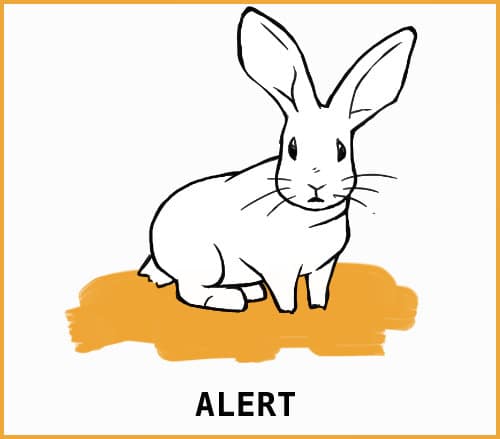
Alert
If your rabbit has their ears forward and is looking intently in a certain direction it means they are on high alert. They could be standing up on their hind legs or alert with all four feet on the ground. This is usually easy to spot, since this behavior is the same in rabbits as it is for cats and dogs.
Going on alert is a way for your rabbit to listen intently when they think there’s a possibility of danger. Sometimes the rabbit might seem to randomly go on alert, even when you don’t hear anything. Rabbits have big ears for a reason, so they can hear sounds from far away. Sounds that can’t be detected by humans.

Binky
That crazy jump and twist in the air that your rabbit does? That’s called a binky, and it means your rabbit is very happy!
A binky is literally a jump for joy. Your rabbit is just too happy to stand in one place. Often times, binkies will be accompanied by high speed zooming around the room. Your rabbit is so happy and just cannot contain all the energy they have.
When your rabbit isn’t feeling quite as high energy, they may perform what I call a ‘mini binky.’ This looks like the start of a binky, but the rabbit never comes all the way off the ground. In the end, only their head does a little happy twist.

Boxing
When a rabbit stands up on their hind legs and raises their front paws to swat at anyone who comes close, they are exhibiting the boxing behavior. Their ears will be up and they will have most of their weight on their toes instead of their heels. The rabbit might growl too.
This is an aggressive rabbit behavior. Most of the time, rabbits would prefer to run and hide instead of fight, but you might come across a stubborn rabbit who chooses to stand their ground. I see this often in videos where people introduce their pet rabbit to their dog. It might look like the rabbit is being cute, but in reality they are very upset and ready to fight.
You might also notice this behavior when you’re entering your rabbit’s territory. For example, if you step inside your rabbit’s enclosure, they may want to protect their space and take a boxing stance to try to fight you away.
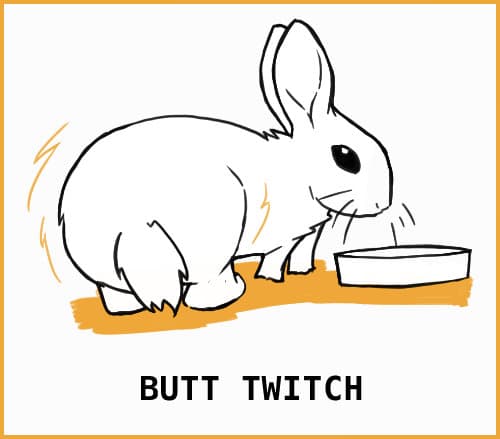
Butt twitching
When you give a rabbit a yummy treat, you might notice that their butt starts to twitch. It could even be twitching so fast that it looks like their butt is vibrating. This means that your rabbit is very happy and enjoying the food you just gave them.
This is one of the less common rabbit behaviors. I’ve only seen butt twitching regularly in one rabbit, a little guy who’s butt even twitched when eating his daily pellets. But I do see it occasionally in other rabbits that I interact with at the animal shelter.

Cautious
A cautious rabbit will slowly tip-toe around with their ears forward and their tails down. They’ll probably pause a lot to look and listen, or they might stretch out as far as they can with their back feet staying in the same place. In this position they’ll be ready to back up and make a dash for it if they get scared.
This is an incredibly common rabbit behavior, and you are likely to see it at any time when the rabbit is entering a new room. They’ll also be cautious if there is any new object for them to check out, or if there are any new people around.

Chewing
Rabbit teeth are constantly growing, so they have a natural instinct to chew on everything. They’ll chew on wires, baseboards, furniture, clothing, and anything they can get their teeth on.
This is one of the more frustrating bunny behaviors. It can be very destructive, but the have to chew on things for their own health. So to protect your house, you’ll have to rabbit-proof anything you don’t want your rabbit to chew up. And you should give your rabbit other chew toys to help them keep their teeth trim without chewing on your furniture. (Here’s my list of awesome chew toys to get your rabbit)

Chin rubbing
This is your rabbits way of claiming her territory. The rabbit will rub their chin against the leg of a table, the corner of the wall, or anywhere they want to claim as their own. Rabbits have scent glands under their chins, so this spreads their scent around. If any other rabbit were to come into the area, they would know the space is already claimed.
You will most often notice this behavior when your rabbit is exploring a new place. I also find my rabbits tend to chin my clothing if I come home with the scent of any other animal on me.

Circling
When a rabbit runs circles around your feet (or run figure eights between your legs), this is a sign of excitement and love. A lot of times the rabbit will be making a cute oinking sound (some people call it honking), while they’re at it.
Most often you will see this behavior when your rabbit expects a treat from you. Sometimes they’ll smell the yummy treat in your hand. Sometimes it’s the time of day when they usually get a treat, so they’re really excited about it. My rabbit also gets really excited to see me when I come back from vacation. As soon as I get home, she’ll start circling my feet and following me around.

Cold shoulder
Some rabbits can really hold a grudge. If you do anything to upset your rabbit, like rearranging their cage or clipping their nails, they might refuse to interact with you for a little while. Usually they will let you know they are disappointed in you by purposefully sitting with their butt facing you and giving you the cold shoulder.
My old bunny, Tenshi, used to do this to me all the time, especially when I had to give her medication every day for her arthritis. She would grumpily put her back to me and hop away if I tried to pet her. She would even refuse to take treats from me for a couple hours, to really make sure I knew how upset she was.
But don’t fret too much if your rabbit is giving you the cold shoulder. They’ll eventually come around and forgive you. Just be patient and give them their space for a little while.

Confident
A confident rabbit will be more relaxed in their environment. If they are an uppity-eared bun, their ears will be resting at a comfortable 45º angle. Not flat on their back or too far forward. Their nose will be twitching at a normal speed and they’ll be sitting in a calm position. They won’t look like they’re about to bolt.
If the rabbit has settled into their environment, this should be their default, normal body language. It means they are calm and comfortable in their home and they’re not afraid of being attacked or harassed.

Curious
Curious rabbits body language often looks very similar to that of a cautious rabbit. The two behaviors usually go hand-in-hand, since curious rabbits will also be cautious about the new objects in their environment.
When a rabbit is curious, they will slowly approach the object of interest on tiptoe with their ears forward. Their nose will be going faster than usual to try to sniff out anything new.

Digging
Rabbits are natural burrowers, which means in the wild they dig tunnels for a living. Domesticated rabbits haven’t given up their digging habits, it’s too ingrained in them as an instinct. So your rabbit might try digging into corners and under doors, especially the females. They would be the main nest diggers.
You can rabbit proof your house and keep your rabbit from destroying your rugs by putting down plastic mats or area rugs in corners of the room. This way your rabbit can still partake in their natural behaviors without destroying your house.

Flattening
This is when rabbits flatten themselves completely onto the ground. Their body will still be tense with their paws still on the ground and ready to run, and their tail will be extended and down behind them.
A rabbit that flattens onto the ground is a submissive rabbit. It can be a sign that they are scared. But they may also be saying they understand their place in the social hierarchy. The submissive rabbits will do this to “bow” to the dominant rabbits.
This is not to be confused with the way rabbits relax as they’re being pet. You might notice your rabbit almost melting into the floor when you give them a back massage. That just means they’re getting comfortable and has nothing to do with being scared or submissive.

Flicking you off
Have you ever noticed when you put your rabbit down after holding them that they flick their feet as they hop away? This means, in very strong language, that they are upset with you. You might see it at other times when your rabbit is upset with you too, like after you trim their nails. And it is often followed by your rabbit giving you the cold shoulder and completely ignoring you for a while.
This is one way rabbits will really show you their personality. Some will come right back and forgive you as soon as they hear the sound of a treat. Others will wait for you to come and give them a massage. I even had one rabbit who would ignore me for hours after getting upset with me, and would completely refuse any peace offering I tried to give her.

Flopping
A rabbit flop can actually look a little scary for new rabbit owners, but it doesn’t have to be. Flopping is when rabbits throw themselves onto their side and sleep. Sometimes they even roll all the way onto their back.
This is actually really adorable, and it’s a sign that the rabbit feels completely safe. But it can be startling if you’re not used to it, because it kind of looks like the rabbit is dead. But if you watch them closely, you’ll see your rabbit is breathing.
If you’re a new rabbit owner and you see your rabbit laying on their side like this, don’t worry! This is a sign your rabbit trusts you completely. Congratulations!
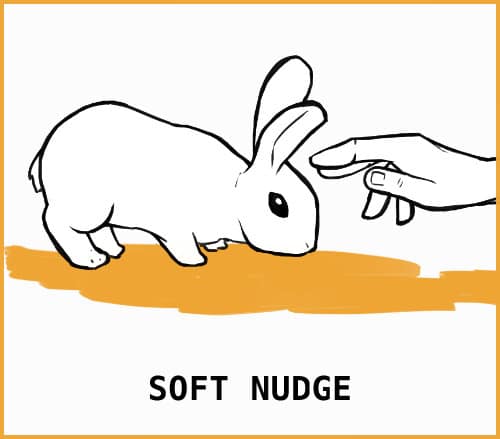
Gentle nudge
Sometimes your rabbit will softly nudge your hand while putting her head down. This means that your rabbit wants you to pet her. Sometimes the rabbit will nudge your arm or your leg instead, but if she’s putting her head down then a massage is in order.
Rabbits absolutely love to be pet, especially on their forehead and behind their ears (but not under their chin, like cats do). You can also massage them all along their back, and watch how they melt into the ground. Petting your rabbit is an excellent way to convince them to trust you. Some rabbits even like to be pet more than they like treats!
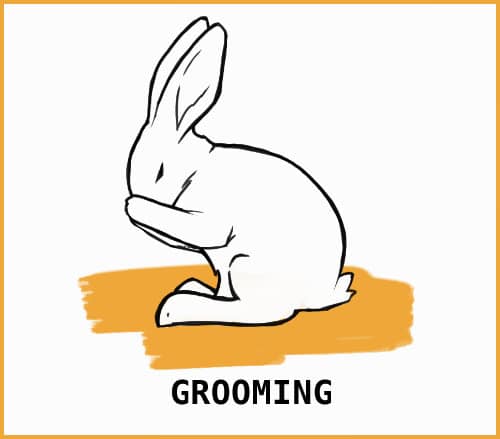
Grooming
This is the cutest thing you will ever see. Rabbits groom themselves all over. You’ll see them turning all the way around to groom their backside. And you’ll also see them use their little paws to clean their face and ears.
Rabbit cleaning habits are mesmerizing to watch. They are actually very clean creatures, and will spend a lot of their time grooming.
Interestingly, I’ve noticed that many rabbits are a little bit modest. These rabbits are less likely to start their grooming routine if they know someone is watching. This is probably because, when rabbits clean themselves, they don’t pay as much attention to their surroundings. As a safety tactic, they’ll make sure to scan the area before starting their grooming routine.

Hard nudge
If your rabbit gives you a very hard nudge with their nose, this is your rabbit telling you to get out of the way. Usually, your rabbit wants to go someplace past you, and you’re blocking the way.
Some rabbits will give you a hard nudge and wait patiently for you to move. If you don’t they’ll try to find another way around. These are the polite rabbits. Most bunnies will give you a hard nudge, and if you don’t move right away, they’ll try to force their way through. Sometimes they’ll even give you a little nip to encourage you to move faster (rude!).

Hunched position
This one is very serious. A hunched rabbit is similar to a loaf, but your rabbit will look very uncomfortable. They will be up on their front paws a little bit to try to avoid pressing their belly into the ground. Their eyes might also be squinted, rather than the typical wide bunny eyes. If you see your rabbit in a hunched position, it will look like they want to settle down into a loaf but don’t want to put pressure against their stomach.
If you ever notice your rabbit sitting like this, it means there is likely something wrong with their digestive tract. You will want to watch your rabbit very closely and check to make sure they are eating and pooping. If their behavior doesn’t change, then you’ll want to take your rabbit to the vet right away. There’s a good chance they might be experiencing GI stasis and require medical attention.

Licking
Rabbits will often lick people or objects in the room. Part of the motivation behind this is to mark their territory. Licking is one way to spread their scent onto objects and claim them. But licking is also how rabbits groom.
You might notice your rabbit really likes to lick the sofa, or they have a tendency to lick certain pillows. This is more related to their grooming habits than any territorial instincts. In groups, rabbits will groom each other by licking. The texture of some sofas, pillows, or clothing could be similar enough that your rabbit has the instinct to groom them.
Rabbits will also sometimes lick people. Sometimes it’s because there are traces of treat left on your fingers, but most of the time it really is because they love you and want to groom you. This is more often a behavior of rabbits who are submissive, since it would be their job to do the majority of the grooming if they were living in a group.

Loafing
Loafing is when your rabbit fluffs up into a ball and looks like a loaf of bread. This is generally a comfortable position for rabbits and they’ll often sleep in this position, especially in the colder months.
This is a neutral position for a rabbit. They are not in a ready-to-run stance, but it’s also an easy position for a rabbit to dash out of and make a run for it if they get scared. But don’t worry if your rabbit seems to prefer sleeping in a loaf instead of sprawling or flopping. Many rabbits are just more comfortable this way.

Lunging
A rabbit will lunge or swat at you if they are being territorial or feeling scared. They will pull their ears back and bring their tail up as they make a quick lunge forward with their front feet. It will usually be accompanied by a growl, or possibly even a bite.
If a rabbit feels cornered with no way to escape, they may resort to lunging out at someone. The rabbit may also be very aggressive and lunge at people who enter their territory to try to get any intruders to go away.
Often times with rabbits, lunging is a warning. They don’t want to hurt you, but they are letting you know they could if you don’t back off.

Mounting
If you have more than one rabbit you might see some mounting behavior. This will happen even if you have rabbits of the same gender, and even after the rabbits have been fixed (but it should reduce at that point). In addition to being a sexual behavior, mounting is a dominance behavior. Rabbits will try to claim their dominance over others in the group this way.

Nesting
If you have an unspayed female rabbit, you might notice some nesting behavior. She will start to gather bedding and materials, and try to dig into a corner to make a nest for her babies. She will also likely pluck some of her own fur from her dewlap, chest, and forelegs to add to the bedding material.
Sometimes the behavior occurs because the rabbit is actually pregnant. But with pet rabbits that aren’t being bred, this is usually a false pregnancy. This behavior should completely stop if you get your rabbit spayed.

Nipping
Believe it or not, nipping is not usually an aggressive behavior. Nips are not hard bites. They are just little pinches your rabbit will give you with their teeth. They usually don’t hurt much, but your rabbit could inadvertently get you in a more tender spot. If a rabbit gives you a little nip, they might even be trying to help you out and groom you. Most often, though, a rabbit will give you a little nip to either get your attention or tell you to move out of the way.
If you find your rabbit nips you a lot, you can discourage them by shouting “ouch!” loudly whenever they get you. This will help you rabbit understand that what they’re doing is hurting you, and it will eventually teach them to stop.

Periscoping
When your rabbit stands on her hind legs, it means she is curious and is trying to get a better vantage point. This is another one of those adorable rabbit behaviors that is just too irresistible. And your rabbit knows it! This is how they beg for treats.
So if your rabbit comes up to you and stands up with those adorable bunny-eyes and the little, wiggling nose, it’s okay to give them a little bit of a treat. But remember, rabbits have sensitive stomachs, so you don’t want to give them too many snacks. You have to learn how to resist their cuteness!

Scared
A scared rabbit will have their ears and tail down, and you’ll be able to see the whites of their eyes. Usually they will also dash to find a place to hide either under a piece of furniture or in a hiding box.
If you notice your rabbit is leaning away from you or someone else as you reach toward them, that is a sign that they are afraid. You should back off for a while and let your rabbit approach you instead.

Scattered poops
Rabbits will scatter their poops across an area as a way to mark their territory. Unaltered rabbits do this more frequently than rabbits who have been spayed or neutered, but the behavior usually doesn’t disappear completely.
However, once a rabbit feels they own the territory, they will usually stop scattering poop around. So you might see a lot of this behavior in the first few weeks you bring your rabbit home, but then it slowly subsides as your rabbit feels more comfortable. Then the behavior will start up again any time you let them into a new area of the house.

Shaking ears
This is when a rabbit’s shakes their head to make their ears flop around a little. There are three reasons rabbits might do this:
- They are happy. Sometimes this is a mini binky and your rabbit is twitching their head to show they are happy. If your rabbit is happily running around and exploring, that’s usually what a little shake of their ears means.
- They are swatting your hand away. If you are reaching for your rabbit and trying to pet them, but they shake their ears as your hand gets close, they are probably trying to tell you they are not interested in being pet right now.
- They have itchy ears. If your rabbit shakes their head a number of times and then starts scratching at their ears, it means the ears are itchy.

Sniffing
Sometimes rabbits will wiggle their nose really fast and scan the ground with their nose. Or they will spend a lot of time identifying a new object by sniffing at it.
Rabbits do this when they are curious and want to check things out. They’ll also sniff around when they are trying to find objects close up. Rabbits are farsighted and have a blind spot in front of their nose, so sometimes they need to use their sniffer to find things.

Sprawling
This is when a rabbit is laying down on their side or belly, but is not completely flopped over. This is exactly what it looks like, your rabbit is getting comfortable. Sometimes they’ll even put their head down on their paws and look super cute while they sleep.
Like flopping, sprawling is a good indication that your rabbit trusts you. Basically any point when your rabbits back feet aren’t solidly on the ground, it means your rabbit feels safe. A rabbit’s best defense is their ability to run away. When rabbits puts themselves in a position where they have to get up before running away, it’s a big indicator that they see you as a friend, not a threat.
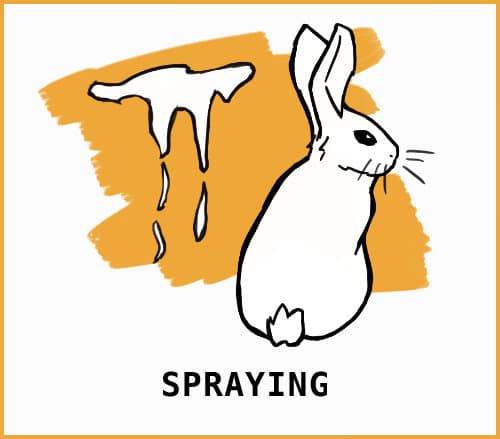
Spraying
Spraying is when rabbits mark their territory with their pee. They will usually (but not always) spray onto a vertical surface and it will usually be in little spurts at a time. This is especially common in male rabbits, but female rabbits are also known to partake in spraying behaviors. Spraying is almost always solved by getting your rabbit altered.

Suddenly running away
Unlike zooming, which is more of a continuous dashing around the room, suddenly running away to hide somewhere means that something spooked your rabbit. Sometimes you’ll know exactly why your rabbit ran away. For example, there was a loud crash in the room. But sometimes it seems a little more random.
Just remember, rabbits have much better senses than we do. So your bunny might hear or smell something they think is dangerous, that you can’t sense at all. Often times, this behavior is accompanied by a thump or two, and your rabbit will stay on alert for a little while afterwards.
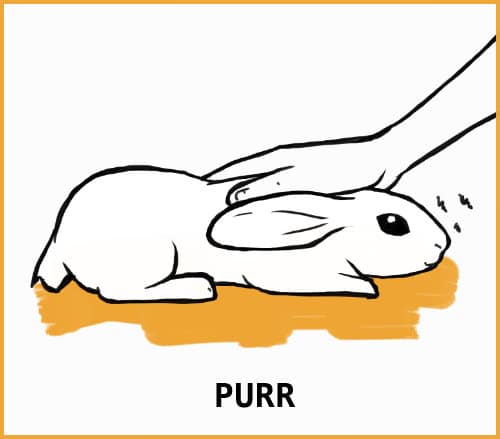
Teeth grinding/purring
Did you know rabbits can purr? Okay, it’s not exactly the same as a cat’s purring. But if you listen very closely when you pet your rabbit, you might hear them softly grinding their teeth together. And if you put your hand on top of their head, you’ll be able to feel a slight vibration. This is what rabbits do when they are happy and content. It means the same thing as a cat’s purring.

Teeth loudly chattering
Not to be confused with the contented sound of teeth purring, loudly chattering teeth is a sign of pain in your rabbit. The sound is similar to that grating, nails-on-a-blackboard noise. It’s not a sound you should hear very often, and it’s usually a sign that something is wrong and you should go see a vet.
The loud teeth grating will usually happen when the rabbit is sitting in a hunched position, or otherwise looks uncomfortable.

Territorial
Rabbits are usually very gentle creatures, especially if they have been spayed or neutered. If a rabbit is displaying aggressive behavior, they will pull their ears back and growl at you to warn you. But it’s very rare for a rabbit to attack anyone out of the blue.
Generally there are only two reasons a rabbit will bite you:
- The rabbit feels completely cornered and afraid. Even in this scenario, rabbits will usually try to swat at you before they try to bite.
- You are encroaching on the territory of an aggressive rabbit. Rabbits, by nature, are territorial. Most of the time they will only get aggressive toward other rabbits, but sometimes they’ll get a little defensive toward humans as well.
Most of the time rabbits are very gentle, but if you do notice aggressive or territorial behavior, try to leave them alone for a little bit to give them a chance to cool down.

Throwing
Rabbits like to throw toys around. They throw their toys around often when they are playing. They’ll take the toy in their mouth and lift their head to throw the toy to the side. Then they’ll go get the toy and do it again.
Sometimes rabbits will also throw things around when they’re a little frustrated or bored. For example, if they are kept in an enclosure that’s too small, they might resort to throwing their food and water bowls around (some rabbits will do this even if they have plenty of space).

Thumping
This is the loudest sound you will hear your rabbit make (it sounds like dropping a heavy text book on the floor). It’s when your rabbit thumps their strong hind legs against the ground. It might even be loud enough to wake you up at night. If you’ve seen the movie Bambi, you might think that thumping is a sign of a content rabbit, but it’s actually the opposite.
A thumping rabbit means one of two things:
- Danger! I sense danger and I’m trying to warn you.
- I am upset with you!
Sometimes your rabbit will thump just once and then be done. Either the danger has passed or they think they got their point across. But sometimes a rabbit will keep thumping many times. If your rabbit won’t stop thumping it’s probably because she is afraid of something. Try to see if you can comfort your rabbit or distract her with a treat.

Yawning
A rabbit will place their front feet forward, one at a time, and life their head for a big yawn. They’ll do this before they go to sleep and after they wake up, just like humans and many other animals.
If your familiar with dog body language, you might wonder if rabbits yawn when they get nervous or uncomfortable. But that’s not a common meaning of yawns in rabbits, the body language is just different in this case.

Zooming
This is when the rabbit races in circles, or figure eights, around the room over and over again. It means your rabbit is very happy and excited and they’re just full of energy. You might even see a few binkies as they zoom their way around the room.
I’ve noticed this happens most often in the early morning with my buns. They’re just waking up and getting really excited now that they know breakfast is just around the corner.
CTTO: BUNNYLADY
Comments
Post a Comment